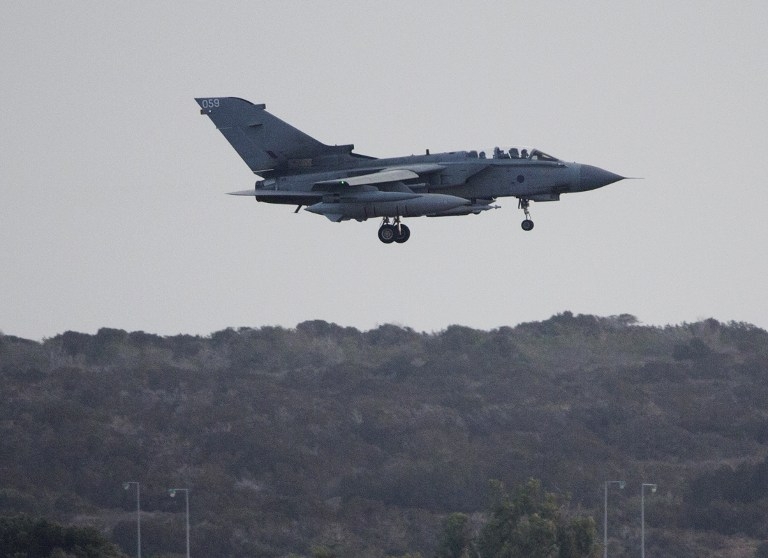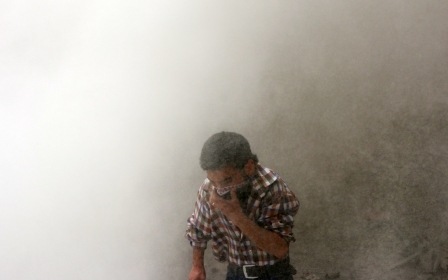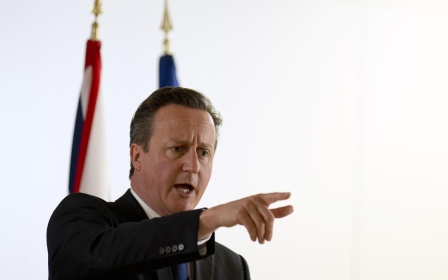British pilots flew airstrikes against IS in Syria

British military pilots carried out airstrikes in Syria while embedded with allied forces fighting the Islamic State group, the UK government has confirmed, despite parliamentary opposition to military involvement in the civil war-stricken country.
Responding to a freedom of information request, the Ministry of Defence said that Royal Air Force pilots embedded with US and Canadian forces “operating in Syrian airspace” had flown “strike missions” against IS targets.
British forces have been involved in the air campaign against IS in Iraq since last September but they have not formally participated in the wider coalition effort targeting territory held by the group and other Islamist factions in Syria.
The British parliament voted against military action in Syria in 2013, and Michael Fallon, the British defence secretary, had earlier indicated that any expansion of the UK’s air campaign to Syria would be put before parliament.
Critics on Friday accused David Cameron, the British prime minister, of displaying contempt for democracy and of keeping the public in the dark about the activities of the country’s armed forces.
“Parliament voted against bombing Syria two years ago. Now we find that the government ignored this and allowed British pilots to bomb under US command,” Lindsey German, one of the founders of the Stop the War Coalition, told MEE.
“This was a political and not a military decision and shows the contempt our prime minister has for democratic decisions. This should stop now and we should oppose all further attempts to bomb Syria.”
'Open and honest debate'
The Ministry of Defence revealed details of British involvement in Syria in response to a freedom of information request submitted by Reprieve, a human rights organisation, which made the information public on Thursday.
“It is alarming that parliament and the public have been kept in the dark about this for so long,” said Jennifer Gibson, staff attorney at Reprieve.
“Yet more worrying is the fact that the UK seems to have turned over its personnel to the US wholesale, without the slightest idea as to what they are actually doing, and whether it is legal.
“We need an open and honest debate about UK involvement in Iraq and Syria. We can’t have that, though, until the UK comes clean about what actions its personnel are already undertaking.”
Responding to Reprieve, the Ministry of Defence said it did not have information on the specific number or location of airstrikes carried out by British pilots, and said that its personnel were subject to the chain of command of the forces with whom they were embedded.
“UK military personnel embedded with the USA, French and Canadian armed forces have been authorised to deploy with their units to participate in coalition operations against ISIL. UK embeds operate as if they were the host nation’s personnel, under that nation’s chain of command,” it said.
“These personnel include pilots flying ISR [intelligence, surveillance and reconnaissance] and strike missions against ISIL targets using the equipment of those units. Of these three nations only the USA and Canada are operating in Syrian airspace.”
A Ministry of Defence spokesman told the UK’s Press Association news agency that there were currently no British pilots operating in Syria and said only “small numbers” had been involved in operations there as part of the embed programme.
Fallon has argued for an extension of British military involvement in the international campaign against IS and suggested it is an “illogicality” to target the group in Iraq but not in Syria. British armed forces have committed about 1,000 personnel to the coalition, with most of them involved in airstrikes in Iraq launched from bases in Cyprus and others deployed in training and advisory roles with Iraqi and Kurdish forces.
On Thursday Fallon announced plans to deploy a second RAF spy plane to the region later this year and said the UK was the only coalition member conducting “manned ISR” over Syria.
'Lack of leadership'
Cameron has also suggested that the UK should consider joining the military effort in Syria after 30 British tourists died in an attack claimed by IS on a beach resort in Tunisia last month.
Earlier this week he invited several senior members of the opposition Labour Party to attend a meeting of the government's national security council in an effort to win cross-party support for potential attacks on targets in Syria.
A spokesperson for Cameron said on Tuesday: "He has been clear he wants to approach this with consensus. He thinks it is important that people understand the nature of the threat."
The Labour Party said it would call for the government to make a statement about the airstrikes in parliament on Monday. Jeremy Corbyn, one of four candidates currently running for the leadership of the party, said the government needed to be straight with the public and said there was no mandate for UK involvement in Syria.
"It absolutely has no authority for British forces to be involved in Syria. The excuse that these individual pilots are embedded with other airforces seems to me a very difficult and dodgy argument," Corbyn told Sky News television.
Criticism of the role of British pilots in the skies over Syria also came on Friday from inside Cameron's governing Conservative Party, with one parliamentarian suggesting the government had displayed "an insensitivity to parliament's will".
"I think this is a lack of, if anything, political leadership. We had a major vote. There should be sensitivity on this issue, and we should be very sensitive to the fact that we have military personnel participating, in effect, in military intervention," John Baron, a Conservative MP, told BBC Radio's Today Programme.
"Those individuals should be withdrawn from the embedded programme whilst this vote holds sway, while it still has authority, until we vote again. This is at the end of the day what parliamentary democracy is all about, regardless of the pros and cons of military intervention."
Members of parliament rejected a government motion seeking support for British military backing for a proposed US-led campaign against Syrian government forces in 2013 following a deadly chemical weapons attack on the outskirts of Damascus. The US subsequently ruled out taking unilateral military action against Bashar al-Assad's government.
The US-led coalition against IS has conducted thousands of airstrikes in Iraq and Syria since launching Operation Inherent Resolve last year. Coalition forces on Wednesday bombed 15 targets in Syria and 16 targets in Iraq, US Central Command said in its latest operational update.
-Charles B. Anthony contributed to writing this report.
Middle East Eye propose une couverture et une analyse indépendantes et incomparables du Moyen-Orient, de l’Afrique du Nord et d’autres régions du monde. Pour en savoir plus sur la reprise de ce contenu et les frais qui s’appliquent, veuillez remplir ce formulaire [en anglais]. Pour en savoir plus sur MEE, cliquez ici [en anglais].




